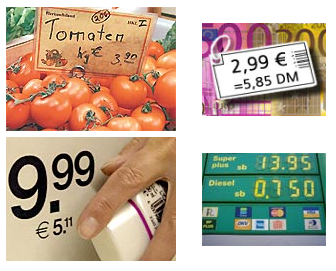When we express prices in English, the currency itself will be in the plural if the number is greater than one e.g. "three euros and eighty cents", "two pounds fifty" etc.
In German prices however, the currency is always in the singular in prices regardless of the amount - drei Euro achtzig, zwei Pfund fünfzig. Similarly, although one euro consists of a hundred cents, the word "Cent" is only written in the singular in German prices - i.e. zwölf Euro (und) zehn Cent (= twelve euros and ten cents).
A tipNote that in written German, a comma is invariably used in prices wher we would put a decimal point in English. Thus € 3,99 (or 3,99 €) means "three euros and ninety-nine cents". In shops and supermarkets however, price tickets can either display a comma or a decimal point, as the price tags below display.

 英语
英语 日语
日语 韩语
韩语 法语
法语 西班牙语
西班牙语 意大利语
意大利语 阿拉伯语
阿拉伯语 葡萄牙语
葡萄牙语 越南语
越南语 俄语
俄语 芬兰语
芬兰语 泰语
泰语 丹麦语
丹麦语 对外汉语
对外汉语

